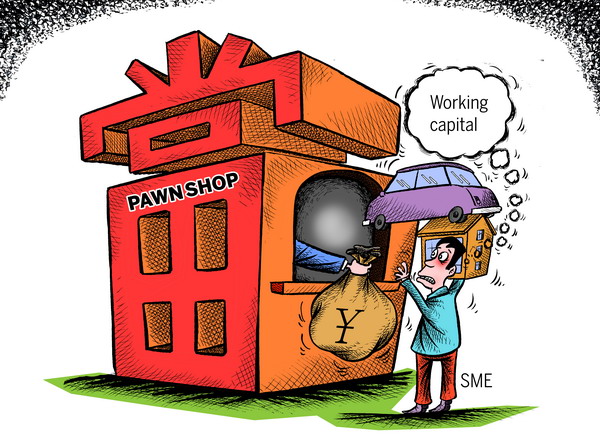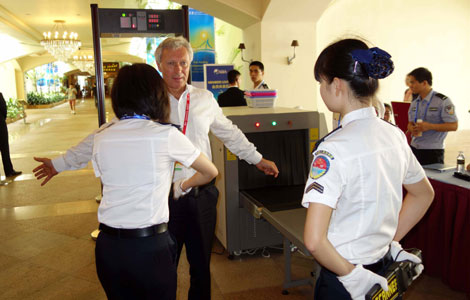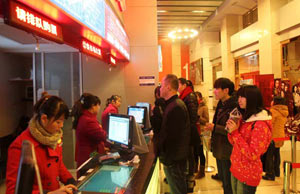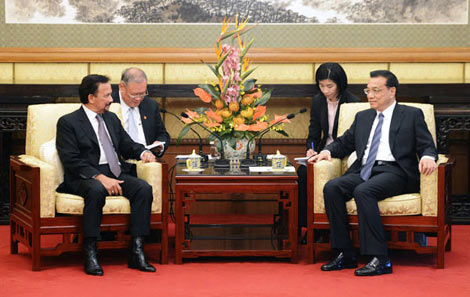
Many private business owners turn to pawnshops to find alternate funding options
After knocking on several doors, Wu Xiang finally raised the money required for urgent business expenses from a pawnshop in Tianjin by pledging his more than 2 million yuan ($321,000) Porsche Panamera as collateral for a cash loan.
Though the monthly interest of 4 percent on the 1.5 million yuan loan is steep, Wu, the 34-year old owner of a small trading company in Tianjin, says he has no regrets in pledging his prized car as "profit margins are shrinking and there are virtually no other financing avenues."
|
 Many small and medium-sized enterprises' owners went to pawnshops and mortgaged their cars for short-term loans during the year-ending period. SMEs are increasingly facing a working capital crunch, as banks are reluctant to lend to them due to their poor business record. [Photo / China Daily] |
Wu, is not alone in his predicament as several small and medium-sized businesses in China are struggling to find alternate financing options to stay afloat especially in the November-December period.
Like Wu, many of the small and medium business owners are now increasingly turning to pawnshops, so much so that they have become an integral part of China's modern financial landscape.
"I urgently needed 1.5 million yuan to make the balance payments to my business partners, pay a final loan amount to the bank and for the salaries of my employees before the end of the month," Wu said.
Having said that, Wu adds that he would redeem the prized car as soon as he gets alternate financing from a bank. He says that this is not the first time that he has had to trade in his belongings for short-term funds as he had earlier pledged his apartment for a two-month loan of four million yuan in 2011.
Unlike the loan procedures in financial institutions, which normally take up to a month for approval, pawnshops often offer instant money. The process usually consists of pledging the assets along with the related documents at a pawnshop.
"I needed to solve my financial problems within two weeks, and pawning the car was the quickest and easiest way to raise funds," said Wu.
Traditionally, people pawned clothes, antiques and valuables like gold, silver or jade at pawnshops. However, in recent times Chinese pawnshops have become much more diverse and seen assets like real estate, private cars and equity shares being pledged for quick money.
"Efficiency, convenience, flexibility and customized service often make pawnshops the most preferred financial channel for individuals and enterprises," said Yang Yong, the manager of the automobile business department at the Huaxia Pawnshop in Beijing.
Huaxia has grown to become one of China's biggest pawnshops since its launch in 1993 and currently has over 20 branches in Beijing.
"People are no longer going to pawnshops for survival, but consider it a viable option to deal with emergencies," Yang said.
Latest reports
SMEs gain greater access to funds
APEC economies vow to boost SME development
Small, micro firms struggle with dip in overseas orders, cash-flow woes
Monitor cash flow to control SMEs loan risks: experts
SME confidence slips again in Q3
Performance to determine SME funding applications
China SME Global Development Forum held in Austria
Find more in
 'Cat model' to dazzle Shanghai auto show 2013
'Cat model' to dazzle Shanghai auto show 2013
 Models at Tokyo modified car show
Models at Tokyo modified car show
 Shanghai Fashion Week focuses on domestic brands
Shanghai Fashion Week focuses on domestic brands
 Angel-dress models at Shandong auto show
Angel-dress models at Shandong auto show
 Safe and Sound
Safe and Sound
 Theater firms scramble for managers
Theater firms scramble for managers
 Premier pledges closer ties with Brunei
Premier pledges closer ties with Brunei
 Volkswagen's all-new GTI at New York auto show
Volkswagen's all-new GTI at New York auto show